![[New] Digital Content Broadcast via Microsoft Streamer for 2024](https://thmb.techidaily.com/d0c9b7047797b18daa1e1aa41be92c363eb13ba8f8bfa2b570a90a8bfa430bd1.jpg)
[New] Digital Content Broadcast via Microsoft Streamer for 2024

Digital Content Broadcast via Microsoft Streamer
A Complete Guide to Recording, Sharing and Managing Videos with Microsoft Stream

Max Wales
Mar 27, 2024• Proven solutions
The way businesses communicate internally has changed drastically over the last few decades. The Enterprise video market’s current size exceeds $16 billion and it is expected to reach $40 billion by 2022. These numbers show that communication through videos is becoming increasingly popular in business contexts and that their significance for the success of a business is going to continue rising in the foreseeable future.
In April 2015 Microsoft has launched Office 365 Video , a video sharing platform that has been replaced by Microsoft Stream just two years later. Both platforms are a part of Microsoft’s mission to provide organizations of all sizes with a safe place to share their videos. If you would like to find out more about the Microsoft Stream, you’ve come to the right place, because in this guide we are going to provide you with all the information you’ll need to record, upload, and manage videos on Microsoft Stream.

- Part 1: What is Microsoft Stream?
- Part 2: What Can I Do with Microsoft Stream?
- Part 3: How to Use Microsoft Stream?
- Part 4: How to Record Videos in Microsoft Stream?
- Part 5: How to Upload Videos in Microsoft Stream?
- Part 6: How to Manage Videos in Microsoft Stream?
![]()

The All-in-One Screen Recorder & Video Editor
- Record desktop screen, voiceover, and webcam simultaneously
- Edit recorded clips quickly with a wide range of professional tools
- Built-in plentiful templates and effects
- Export to MP4, MOV, MKV, GIF and multiple formats
For Win 7 or later (64-bit)
For macOS 10.12 or later

What is Microsoft Stream?
Microsoft Stream is a corporate web-based YouTube-like platform that enables companies to easily share their videos online and protect their privacy at the same time. You can either use it as a stand-alone web-based application or through the Office 365 Video Enterprise subscription.
Microsoft Stream is designed to help organizations, upload, share, and manage large amounts of video files from one place. However, broadcasting live corporate events, webinars or staff training sessions is not yet possible on Microsoft stream, while the maximum video storage for a single user is limited to 500 GB. Signing up and creating an account is free, but you’ll have to choose a monthly plan to use the platform on an ongoing basis.

What Can I Do with Microsoft Stream?
Setting up an account on Microsoft Stream is a straightforward process that will take just a couple of minutes. After you’ve created an account, you will be able to record, upload and share videos, insert metadata, manage videos, or gain access to advanced video search options.
1. Uploading videos and adding the metadata
Microsoft Stream allows its users to upload video files in bulks or one by one and it offers support for a wide range of video file formats, including some of the most frequently used file types such as MOV, AVI, MP4, or FLV. When you upload a video you can also change its title, select a thumbnail, add hashtags, and edit all other metadata of your videos from within the platform. The portal automatically converts all of the files you upload to Microsoft Stream and optimizes them for viewing on all devices.
2. Managing videos
Users can organize their videos thematically, or in any other way through video channels, like on YouTube, and they can also subscribe to channels so they don’t miss the latest uploads. Creating a watchlist that is displayed on your homepage is also an option Stream provides, so you can make your selection of videos.
3. Sharing videos
Once you’ve uploaded a video to a Microsoft Stream account, you can set its privacy settings to public or private. The platform also enables you to assign videos to multiple channels or groups of viewers of your choosing. Companies can share their videos internally via links, embed codes, or emails that enable the recipients to watch password-protected videos on different platforms.
4. Searching Videos
The metadata improves a video’s searchability as well as its availability to the Stream’s users. Titles, hashtags, and meta descriptions can be used as search terms, but keep in mind that you’ll only be able to view public videos.
How to Use Microsoft Stream?
Before you go ahead and upload your first video to Microsoft Stream, there are just a few more things you should know. The owners of the Office 365 Video account, can access Stream from their accounts, by clicking on the ‘Explore all your apps’ feature and selecting it from the menu. Alternatively, you can create an account on the Microsoft Stream platform, and enjoy the 90 days of the free trial period. Monthly subscriptions for Stream vary between $3 and $5 depending on the pricing plan you’ve selected.

At the moment, there are no Android or iOS apps for Stream, but this doesn’t mean you can’t view videos on this platform from any web browser on any device, including Mac and PCs or Smartphones. You’ll need a 64-bit Windows 7 or later OS if you want to use Microsoft Stream from a PC, while Mac owners must have 64-bit Mac OS 10.11 or later installed on their devices to use this platform.
Here’s how you can record, upload, and manage videos with Microsoft Stream.
How to Record Videos in Microsoft Stream?
Capturing videos with Microsoft Stream requires you to install the inbuilt screen recorder on your computer. You can accomplish this by clicking on the Create menu and selecting the Record a Video option from your account.
Choose the version of the screen recorder that is optimized for the OS you’re using and complete the installation process. This is a one-time procedure and you’ll be able to launch the Stream’s screen recorder from your account for each new session.
Step 1 - Launching the Screen Recorder
To initiate the screencast, you’ll have to repeat the steps you took to install the screen recorder on your computer, so just click on the Create menu, once more and then pick the Record a Video feature from the list.
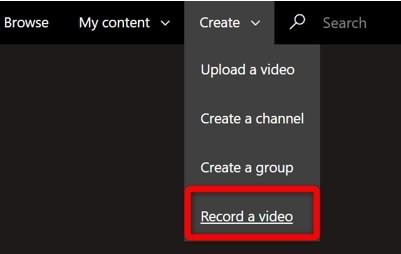
Step 2 - Adjusting the video settings
Once the screen recorder loads, you’ll be able to select the area of the screen you want to capture, record audio from an external device, and record system audio.
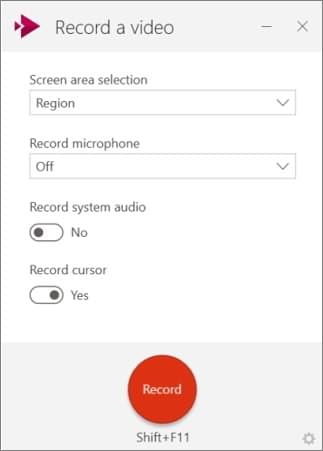
The limited scope of screen recording features also includes the system audio recording option and the feature that enables you to record the movement of your cursor. Don’t start recording before you’ve adjusted all the settings following the demands of the video you’re working on. Hold the Shift + F11 buttons to start recording or click on the big red Record button.
Step 3 - Screencasting with Microsoft Stream
During the screen capturing session, you can mute the video or cancel the process. You can’t capture footage with a webcam with Microsoft’s Stream desktop capturing tool and you can’t draw on screen or use any of the advanced tools for screencasting.

There are no limitations on the duration of your videos, but longer videos are often bigger and they take more time to upload to the platform. You can stop recording by clicking on the Record button.
Step 4 - Post Processing
Immediately after the recording is finished, you’ll be able to preview the video, but Microsoft Stream doesn’t offer even the basic video editing tools. If you want to edit a video, you’ll have to use some other software, and you’ll have to upload a video from your Stream account. Users that don’t want to edit their videos can proceed to upload the content to a group or a channel they are managing.
How to Upload Videos in Microsoft Stream?
The process of uploading videos to this platform may be time-consuming if you are uploading more than just one video, but it is by no means difficult. However, the steps you’ll need to take to upload a video depending on where on the portal you want to upload your video. Here’s how you can upload videos to Microsoft Stream in just a few steps.
Step 1 - Selecting the videos
Head over to the Create menu, and click on the Upload a Video option. This action will enable you to browse the folders on the hard-drive and pick the files you want to upload. Alternatively, you can just drag and drop the video at the specified location on the Stream platform.
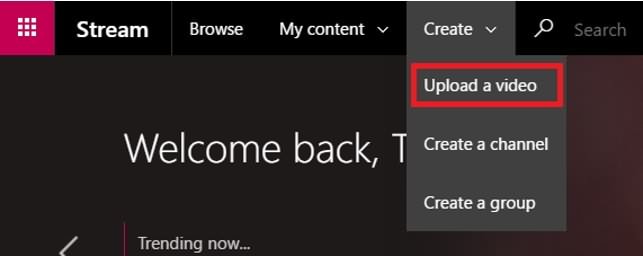
Step 2 - Uploading a video to My Videos Page
Click on the My Content menu, that is located next to Create menu, and select the My Videos option. Drag the files you want to upload to the designated area and drop them to start the upload.
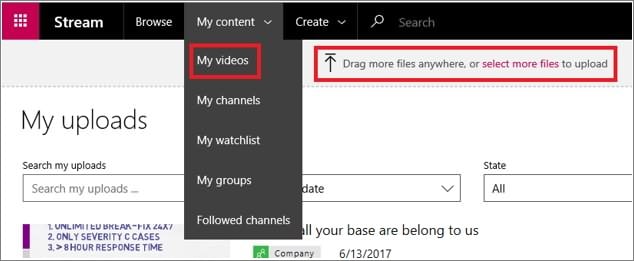
You can also search for videos you already uploaded or alter the search criteria. Wait for the videos to be uploaded and then proceed to add a title, metadata, or even subtitles.
Step 3 - Uploading Videos to a Group or a Channel
If you would like to add a video to a Group on the Microsoft Stream portal, simply open the group and drag and drop the file to the designated place.
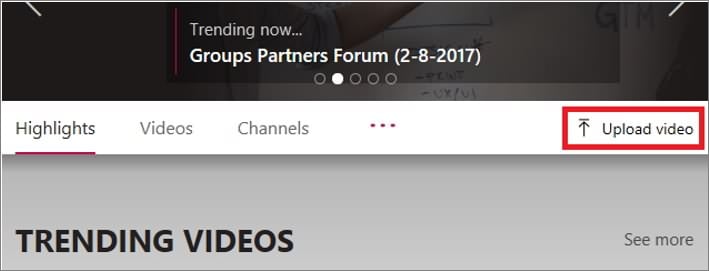
You can either upload a video from the group’s the Highlights or Videos tab, and the videos will become available in the group after the upload is complete.
Microsoft Stream users who want to add a new video to a channel, just have to navigate to the channel to which they wish to contribute and click on the Select More Files option.
Step 4 - Adding Metadata
This step of the video uploading process is important because if done correctly, it increases the video’s chances to appear high in the search rankings.
Descriptions and Titles
Naming videos and adding a brief description that sums up what goes on in them will help other Stream’s users to find them faster. The title of your video can’t be longer than 300 characters, while the description must be shorter than 4000 characters. You can also use hashtags, insert links, or use time codes so the viewers to increase the interactivity of your videos.
Video Language and Thumbnails
A thumbnail is like a video’s profile picture, and the Microsoft Stream platform creates a few automatically, for each video you upload. You can select one of the thumbnails the platform has generated or you can upload an image from your hard-drive.
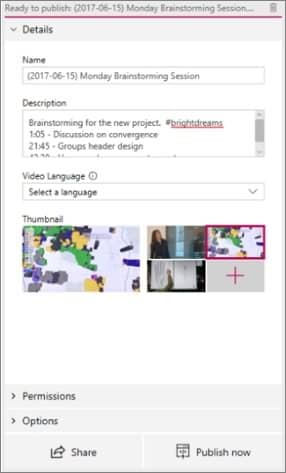
The video language option enables you to select the language spoken in the video. If the language of the video is supported by the portal, the closed caption file will be automatically created which improves the video’s performance in the search results.
Privacy and Permissions
The owner of the video can grant permission to other Stream’s users to view a video. In the Permissions section, you’ll be able to choose the groups or channels where the video will be displayed, or share the video with anyone in your company. Allowing other team members to edit a video, requires you to assign a new owner.
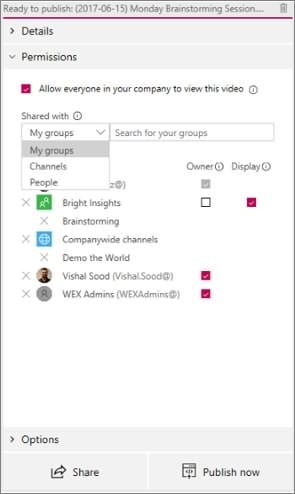
The platform allows you to keep your videos private and available only to users that have a password.
Step 5 - Captions and Subtitle
The Options tab enables you to add captions to a video or upload subtitles. The Video Language feature helps the platform generate captions for all videos automatically, and if you want to upload a subtitle or a caption you’ll need to make sure that they are in the WebVTT file format.
Step 6 - Sharing and Publishing videos
Once you’ve edited the metadata, you can either click on the Publish Now or Share buttons. Clicking on the Publish Now option will start the upload process, and when the video is online it will be shared with everyone you selected.
The Share feature enables you to create a link, by sharing it on an enterprise social network such as Yammer. The link can then be used to share the video on all other social media. If you would like to make further adjustments to the video’s metadata, you can do so by selecting the My Videos option in the My Content menu, and clicking on the Edit option.
How to Manage Videos in Microsoft Stream?
All content you upload to Microsoft Stream will be displayed on My Videos page, and you can edit the metadata, filter, or browse through the videos as well as add videos to channels and groups. The portal enables you to sort out your videos based on different parameters such as view count or publish date, to name a few, which means that you can organize your video collection most functionally.
Editing metadata requires you to go to a group, channel, or My Videos page, click on the More button, and select the Edit option. You can then change the descriptions, hashtags, or any other metadata and improve the video’s search rankings on the platform.
Global administrators and group owners can change the settings of the groups they run. Name, descriptions, or the privacy status can be changed in all groups you manage, and the Delete option is also available if you want to erase a group. In order to do this, you only have to navigate to the group you’re managing and click on the Settings icon.
Summary
Microsoft Stream is still a young platform that facilitates corporate communications through videos. Its features include password protection and amazing sharing options that enable you to distribute a video to an entire company. However, the portal lacks some of the key tools that make communication within an organization easier. Stream’s users can’t capture webcam footage or broadcast live streams, but Microsoft has already announced that many upgrades are in store and that this business-oriented video sharing portal is going to continue to get better.

Max Wales
Max Wales is a writer and a lover of all things video.
Follow @Max Wales
Also read:
- [New] In 2024, Visual Storytelling of PC Playtime - Top 6 Screenshot Secrets
- [New] Screencast Essentials The Ultimate Beginner's Tutorial
- [New] Strategies for Eye-Catching Podcast Previews
- [Updated] 2024 Approved Crafting the Ideal Drone - LiPo Energy Allies
- [Updated] 2024 Approved Maintaining Meetings in Google Recorder
- [Updated] 2024 Approved Step-by-Step Guide to Add Fun Filters and Graphics to Your Snapchat Story
- [Updated] In 2024, Capture Every Moment The Premier 8 Free Screen Capture Apps for Android
- [Updated] SplitCam Review Is It The Best Video Recorder for 2024
- How To Restore Missing Contacts Files from Infinix Note 30 Pro.
- In 2024, How To Check if Your Honor X50i+ Is Unlocked
- In 2024, Quick & Easy How to Record Your iPhone 7 Display
- Sifting Through CodeGPT: Can It Realistically Write Complex Code?
- Snowball Rally Highlights From the Beijing Games, 2022 for 2024
- Streamlining Game Recording Techniques for 2024
- Videography Splitter Verdict Top Cam or Not, In 2024
- Title: [New] Digital Content Broadcast via Microsoft Streamer for 2024
- Author: Duchess
- Created at : 2025-02-03 22:20:12
- Updated at : 2025-02-07 20:04:23
- Link: https://screen-video-capture.techidaily.com/new-digital-content-broadcast-via-microsoft-streamer-for-2024/
- License: This work is licensed under CC BY-NC-SA 4.0.